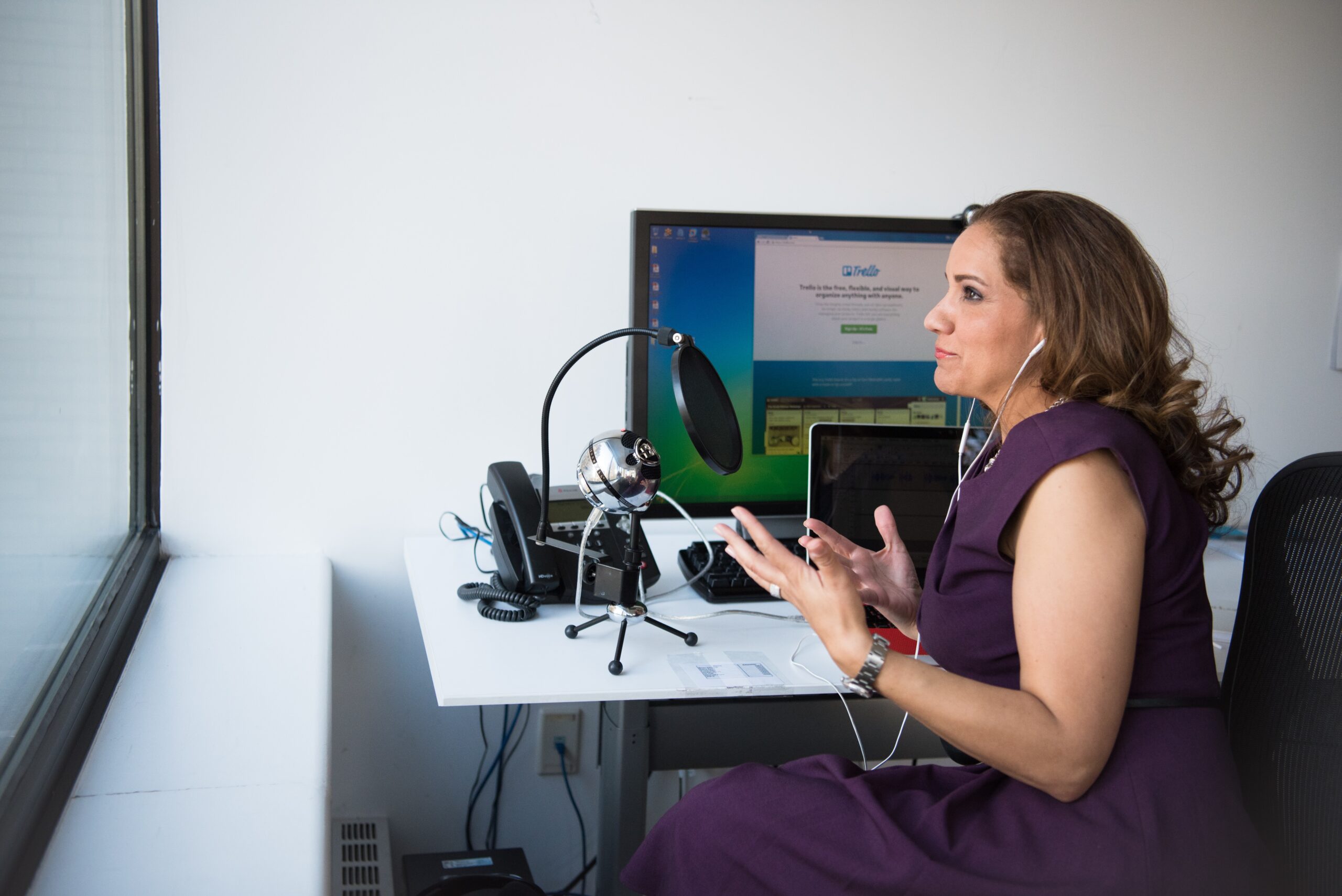With the world becoming more digital by the day, knowing how to ace a virtual interview has become a necessity for job seekers, especially those looking to make a lasting impression. According to the Economic Times, pre-pandemic, face-to-face interviews accounted for over 75% of hiring processes. The hiring landscape has shifted significantly since, with 90% of businesses now opting for virtual interviews in the initial stages of recruitment.
If you’re looking for a new job, chances are your first or second interview will take place virtually. And yes, there are unique challenges and nuances to navigate in a virtual interview setting. But with the right preparation and strategies, you can make a strong impression and increase your likelihood of landing the job. In this guide, we’ll explore strategies and tips to help you impress your interviewer and stand out from the competition, even when not in person.
How do you ace a virtual interview?
Drafting a resume and applying to positions is often time-consuming. However, the interview stage tends to be the most anxiety-inducing part of the recruitment process. Beyond the typical nerves of a first interview, having the interview done remotely can actually introduce more pressure for candidates.
Unlike in-person interviews where you can rely on face-to-face interaction and body language to convey your enthusiasm and competence, virtual interviews make it a little more difficult to leave a memorable presence. Additionally, technical issues such as poor internet connection or camera malfunction can disrupt the flow of the interview and add to the stress.
Thankfully, there are strategies to manage this shifting recruitment landscape. Our team of recruiters is committed to equipping all candidates with the tools they need to thrive in this new era of virtual interviews.
Do candidates prefer in-person interviews?
A recent poll from the American Staffing Association revealed that 70 percent of job seekers prefer in-person interviews, compared with 17 percent who are partial to video calls. The preference for face-to-face interviews is often attributed to establishing a more personal connection and gauging non-verbal cues, such as body language or gestures, that are hard to detect behind a screen.
These in-person opportunities also allow candidates to assess the workplace culture, interact with potential colleagues, and get a broader sense of the company’s daily atmosphere firsthand. While virtual interviews may be more convenient, they don’t always enable candidates to showcase their interpersonal skills most effectively. Or create a stronger rapport with an interviewer.
However, according to Forbes, the virtual interview is the new resume. Job seekers may not be enthusiastic about the prospect, but they are recognizing the importance of honing their virtual interview skills to ensure their presence on screen leaves a lasting impact. The following tips are MSI Recruiting’s best advice for acing a virtual interview:
Refine your environment
In a remote interview, noise and distractions can hinder your performance. Seek out a tranquil, well-lit area devoid of disruptions, allowing you to concentrate fully on the interview. Ensure your backdrop is neat, organized, and projects a professional image to the interviewer.
If needed, opt for a virtual background for a polished appearance. Otherwise, plan ahead to secure a suitable location that provides the ideal setting for showcasing your skills and professionalism. The last thing you want is an interviewer to be more focused on your background than on what you have to say.
Test your technology
Start by checking your internet connection to ensure it’s stable and reliable. Next, test your webcam and microphone to ensure they are functioning properly and that the audio and video quality meet the standards for clear communication. It’s also a good idea to familiarize yourself with the video conferencing platform you’ll be using, whether it’s Zoom, Skype, or another application, to avoid any last-minute surprises or confusion.
Technical glitches can occasionally occur despite your best efforts. But by taking proactive steps to check your equipment in advance, it will help minimize the risk of disruptions during the interview. Ultimately, the goal is a smooth and uninterrupted experience from start to finish.
Treat a virtual interview like an in-person meet-up
When preparing for a virtual interview, it’s essential to approach it with the same level of professionalism as you would an in-person meeting. This includes dressing the part, even if you’re conducting the interview from the comfort of your own home. Choose attire that is appropriate for the industry and company culture. Opt for polished and professional pieces that convey confidence and competence.
While it may be tempting to dress more casually when no one will see your lower half, remember that your appearance contributes to the overall impression you make. It’s important to dress from head to toe. Choosing attire that reflects professionalism will also put you in the right mindset before you begin your interview. Consider the timeless advice: Dress to impress!
Maintain eye contact
Maintaining eye contact during a virtual interview is important for conveying confidence and engagement. While it’s tempting to glance at your own image on the screen or get distracted by notifications, remember to direct your gaze towards the camera to simulate a genuine connection with the interviewer.
This simple gesture demonstrates attentiveness and interest in the conversation, helping you make a positive impression. Not only that, it reflects well on your communication skills, and potential ability to build rapport with colleagues and clients in a professional setting.
Be an active listener
With virtual interviews, time is often of the essence. It’s important that you are actively listening and engaging with the interviewer to show your interest and enthusiasm for the role. One strategy frequently recommended by recruiters is to actively engage with the interviewer through non-verbal cues such as nodding, smiling, or offering concise affirmations like “yes” or “I understand.”
These subtle verbal and non-verbal cues serve dual purposes. First, they indicate your attentiveness and eagerness to participate in the discussion. Second, they foster a sense of connection and rapport, even in a virtual setting.
Showcase your skills
At MSI, we frequently encounter questions from job seekers seeking advice on how to effectively showcase their skills during interviews. One crucial strategy we recommend is to prepare specific examples and anecdotes that vividly illustrate your qualifications and experiences, directly relating them to the requirements of the position you’re applying for.
When preparing for your interview, take the time to identify key skills, accomplishments, and experiences from your professional background. More specifically, the experiences that align closely with the job description. Whether it’s describing a successful project you led, a challenging problem you solved, or a significant achievement you attained, providing concrete examples helps to substantiate your claims and make a strong impression on the interviewer.
Be concise and clear
When answering questions during the interview, try to strike the right balance between providing sufficient information and avoiding unnecessary verbosity. While it’s important to convey key details about your employment history, skills, and experiences, you should aim to do so in a concise and focused manner. Keep your responses clear, to the point, and relevant to the question being asked.
Remember, you could lose the interviewer’s attention and interest in the conversation just as easily as they could lose yours. Brevity is key. Avoid going off on tangents or delving into irrelevant details that could detract from the main points you’re trying to convey.
Follow up
Follow up with a well-crafted thank-you email promptly after the interview. This is the best way to express appreciation for the opportunity and reaffirm your interest in the position. Use this opportunity to reiterate key points discussed during the interview. Emphasize your enthusiasm for both the role and the company.
A common mistake that interviewees make is sending a generic follow-up. The goal is to stand out from hundreds of candidates, so you want to personalize your message to reflect specific details from the interview and showcase your professionalism and proactive approach to communication.

Are virtual interviews here to stay?
The landscape of interviewing has changed drastically in recent times. The prevalence of virtual interviews stemming from the COVID-19 pandemic, is one of the most notable changes. Some job seekers may long for a return to in-person interviews, but the reality is that virtual interviews offer numerous advantages too. This includes convenience and flexibility.
In-person interviews still have their place, of course. Most third or fourth interviews take place in a face-to-face setting. And specific roles require hands-on assessments or site visits to truly gauge candidate suitability. Yet virtual interviews are here to stay as a valuable and efficient tool for both job seekers and employers alike.
What are some strategies you’ve found effective for making a strong impression in virtual interviews? Have you encountered any unique benefits during virtual interviews? Share your experience in the comments below!














